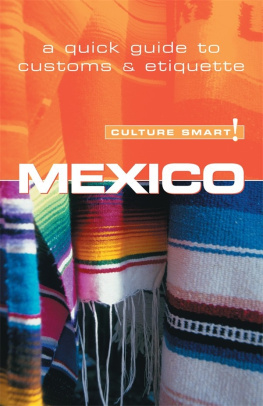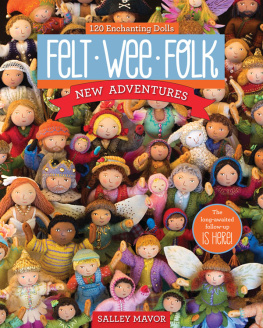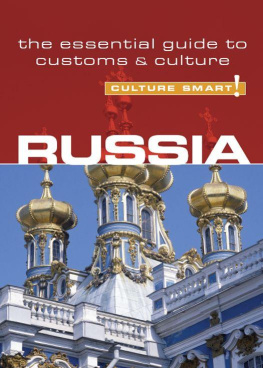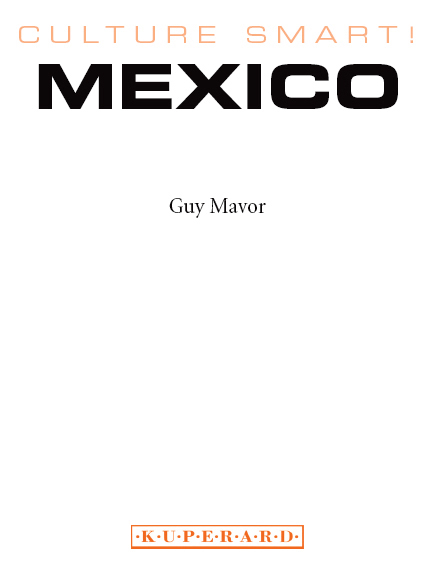First published in Great Britain 2005
by Kuperard, an imprint of Bravo Ltd
59 Hutton Grove, London N12 8DS
Tel: +44 (0) 20 8446 2440 Fax: +44 (0) 20 8446 2441
www.culturesmartguides.com
Inquiries: sales@kuperard.co.uk
Culture Smart! is a registered trademark of Bravo Ltd
Distributed in the United States and Canada
by Random House Distribution Services
1745 Broadway, New York, NY 10019
Tel: +1 (212) 572-2844 Fax: +1 (212) 572-4961
Inquiries:
Copyright 2005 Kuperard
Revised 2008; third printing
All rights reserved. No part of this publication may be reprinted or reproduced, stored in a retrieval system, or transmitted in any form or by any means without prior permission in writing from the publishers.
Series Editor Geoffrey Chesler
eISBN: 978-1-85733-581-1
British Library Cataloguing in Publication Data
A CIP catalogue entry for this book is available from the British Library
Cover image: Woven cloth, Kava.
Travel Ink/Kevin Nicol
v3.1
About the Author
GUY MAVOR is a writer and journalist currently based in London. He graduated from the University of Bristol in 1998 with a BA Hons in French and Spanish, specializing in Mexican history and literature. Since then, he has traveled, researched, and written extensively about his experience of other cultures, ancient and modern, for both television and travel publishers. Guy has lived and worked in a number of countries across the globe, including France, Spain, Mexico, and South Africa. He is coauthor of The Greenwood Guide to South Africa.
The Culture Smart! series is continuing to expand. For further information and latest titles visit www.culturesmartguides.com
The publishers would like to thank CultureSmart!Consulting for its help in researching and developing the concept for this series.
CultureSmart!Consulting creates tailor-made seminars and consultancy programs to meet a wide range of corporate, public-sector, and individual needs. Whether delivering courses on multicultural team building in the USA, preparing Chinese engineers for a posting in Europe, training call-center staff in India, or raising the awareness of police forces to the needs of diverse ethnic communities, it provides essential, practical, and powerful skills worldwide to an increasingly international workforce.
For details, visit www.culturesmartconsulting.com
CultureSmart!Consulting and CultureSmart! guides have both contributed to and featured regularly in the weekly travel program Fast Track on BBC World TV.
contents
Map of Mexico
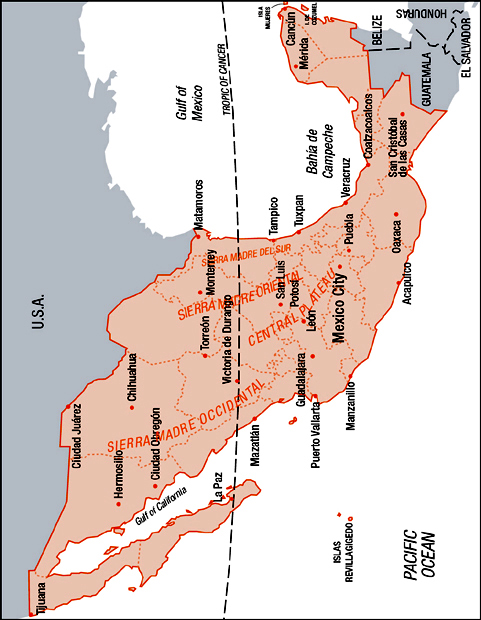
introduction
In the popular imagination, Mexico conjures up images of ancient civilizations, plundering conquistadores, and mustachioed revolutionaries. More penetrating insights are provided by figures such as the artistic colossus Diego Rivera and Nobel Prize-winning writer, poet, and philosopher Octavio Paz. But there is really no substitute for being there and experiencing Mexico for oneself.
The many contradictions of this vibrant land are reflected in the character of the people. Mexicans are intensely fatalistic, resigned even. But when the mood takes them, they are hedonistic and carefree. Likewise, a reserved, poker-faced demeanor will suddenly, once you get to know someone, give way to astonishing warmth and familiarity. The countrys first hundred years of independence were spectacularly bloody, yet it has been at peace for eighty-five years. It shares a long land border with its northern neighbor, yet it could not be more different.
The explanation lies in Mexicos unique history. Five hundred years ago, two previously separate branches of humanity collided in the central Mexican highlands, and the clash reverberates strongly even now. Spain brought Catholicism to Mexico, but its missionaries took a pragmatic approach and incorporated earlier religious beliefs. The defining Mexican festival is known as Da de los Muertos, Hanal Pixan, or the Day of the Dead; it merges All Saints and All Souls Days with indigenous death rituals, and is unlike Catholic celebrations of these feast days anywhere else in the world.
Mexico has emerged from this dual and bloody history to claim its place in the modern world. Today globalization and free trade are altering Mexican society once again. However, the Mexicans have yet to embrace consumerism as a way of life; they still seem to rely on human relationships (the family is paramount) for their happiness.
Culture Smart! Mexico introduces you to the complex realities of modern Mexican life. It describes how history has shaped Mexicans values and attitudes, and reveals what they are like at home, work, and play. The chapter on customs and traditions gives a flavor of religious and public life, while those on meeting people and time out will help you to make the most of your visit. Mexicans value human contact highlythe more effort you make to meet and understand people, the more you will enjoy your stay.
Key Facts
| Official Name | Estados Unidos Mexicanos (United Mexican States) |
| Capital City | Ciudad de Mxico (Mexico City) | Population approx. 22 million |
| System of Government | Federal Republic with an elected President serving a six-year term | Two legislative chambers |
| Population | Approx. 100 million |
| Area | 756,066 sq. miles (1,958,201 sq. km) |
| Geography | Long border with U.S.A. to north, and with Guatemala and Belize to south | Two-thirds of the country lie within the tropics. |
| Terrain | Great diversity of landscapes: incl. Pacific and Caribbean coastlines, large central plateau, snowcapped mountain ranges, desert in north, and jungle in south and east | The low-lying Yucatn peninsula extends east into the Caribbean. |
| Climate | Hugely varied. Coastlines and lowlands hot and humid | Highlands and far northwest coast more temperate |
| Currency | The peso. Divides into 100 centavos |
| GDP Per Capita | US $3,700 |
| Life Expectancy | Men 68 years, women 75 years |
| Ethnic Makeup | Mostly mixed European and Indian | Approximately sixty indigenous groups, mainly in the south |
| Language | Spanish is the official language. Indigenous languages such as Nahuatl and Maya are spoken widely at local level. |
| Religion | Around 90% Roman Catholic |
| Adult Literacy Rate | 89% |
| Press | Each state has own, mostly uncritical, regional newspaper. | The independent national press incl. the left-wing La Jornada and the newer Reforma. |
| Television | TV dominated by telenovelas (soap operas) | Cable and satellite throughout urban areas |
| English Media |

